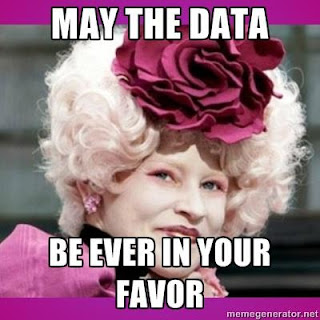Professional Standards
Labels
- Teaching Practice (33)
- Leadership Collaboration and Community (14)
- Commitment to Ongoing Professional Learning (10)
- Co-curricular and Student Life (7)
Showing posts with label Commitment to Ongoing Professional Learning. Show all posts
Showing posts with label Commitment to Ongoing Professional Learning. Show all posts
Monday, April 24, 2023
Wednesday, August 26, 2020
Blended Learning with Seesaw
I just became a Seesaw Pioneer! The first course in a series to ROCK the Blended Learning teaching expectations!
Monday, March 4, 2019
WIDA WORKSHOP
This November my school was generous to fly a WIDA Consultant out to work with our ESL team and other Elementary Homeroom teachers on a 2 day workshop about Differentiation for English Language Learners.
After the workshop, myself (being the ESL coordinator,) along with the Principal met to discuss the big question: NOW WHAT? For our programming. I checked in with my team, and here is what we decided together:
We decided that we would change our leveling system to better reflect the WIDA levels (we have phase 1, phase 2 and phase 3 at the moment). Next year we will change to Level 1, 2, 3, 4. This simple change, will likely result in a big project for me, but I think it is a valuable change!
After the workshop, myself (being the ESL coordinator,) along with the Principal met to discuss the big question: NOW WHAT? For our programming. I checked in with my team, and here is what we decided together:
We decided that we would change our leveling system to better reflect the WIDA levels (we have phase 1, phase 2 and phase 3 at the moment). Next year we will change to Level 1, 2, 3, 4. This simple change, will likely result in a big project for me, but I think it is a valuable change!
Thursday, January 19, 2017
Leadership in EAL
The 2016-2017 school year brought with it a new and exciting opportunity for me to grow as an educator. I have the opportunity to develop my leadership skills as the EAL coordinator at Suzhou Singapore International School. My job has involved leading and supporting the EAL department, leading staff meetings, parent sessions and PD for staff. Assessing new students and working with teachers in a support role to ensure that students are progressing and are in the correct EAL phase.
2016 was a good year for Leadership workshop opportunities at SSIS.
The first weekend workshop was the ACAMIS Leadership Training. Leading Collaborative Teams with Micheal Iannini. We learned a lot of useful, hands on leadership strategies and ideas including new Ice breakers, creating Norms, using protocols, and having difficult conversations.
The second workshop was a 2 day IB workshop. Pedagological Leadership (PYP Category 2) workshop. We learned even more about the changing role of leadership and were able to apply much of the learning to our school context.
2016 was a good year for Leadership workshop opportunities at SSIS.
The first weekend workshop was the ACAMIS Leadership Training. Leading Collaborative Teams with Micheal Iannini. We learned a lot of useful, hands on leadership strategies and ideas including new Ice breakers, creating Norms, using protocols, and having difficult conversations.
The second workshop was a 2 day IB workshop. Pedagological Leadership (PYP Category 2) workshop. We learned even more about the changing role of leadership and were able to apply much of the learning to our school context.
Making the PYP Happen Workshop
I also took part in a 2nd 'Making the PYP happen' workshop in October 2015. This one was run by Yoon-Ah Lee and Jay Brownrigg. I don't know where I have put the certificate though.
Tuesday, February 26, 2013
Using Assessment Results
Friday, November 23, 2012
Exploring Critical Friendship on Behalf of Student Learning
I recently spent 3.5 days in a
workshop learning about, "Critical Friends Group" or CFG. No, it doesn't mean that we
criticize our friends in this group. It is a way of coming together professionally
to discuss, analyze, give professional feed back or generate new ideas as a professional
learning community. I felt energized and had a new sense of community after
completing this workshop with many of my colleagues. I highly recommend this
training. It can be useful for running professional conversations on almost any
topic and everyone's voice is heard in a respectful and efficient way. It is a
way to share leadership and collaborate. Outcomes are achieved in an accelerated,
yet well analyze and reflected way by using the protocols we learned at this workshop.


The following is from the National School Reform Faculty:Harmony Education Center.
Retrieved from the world wide web on November 23, 2012.
What is a
CFG?
A CFG is a professional learning community consisting of approximately 8-12 educators who come together voluntarily at least once a month for about 2 hours. Group members are committed to improving their practice through collaborative learning.
How did the idea of Critical Friends Groups develop?
In 1994, the Annenberg Institute for School Reform designed a different approach to professional development, one that would be focused on the practitioner and on defining what would improve student learning. Since the summer of 2000, Critical Friends Groups training is coordinated by the National School Reform Faculty (NSRF) at the Harmony Education Center in Bloomington, Indiana.
What are the purposes of a Critical Friends Group?
Critical Friends Groups are designed to
A CFG is a professional learning community consisting of approximately 8-12 educators who come together voluntarily at least once a month for about 2 hours. Group members are committed to improving their practice through collaborative learning.
How did the idea of Critical Friends Groups develop?
In 1994, the Annenberg Institute for School Reform designed a different approach to professional development, one that would be focused on the practitioner and on defining what would improve student learning. Since the summer of 2000, Critical Friends Groups training is coordinated by the National School Reform Faculty (NSRF) at the Harmony Education Center in Bloomington, Indiana.
What are the purposes of a Critical Friends Group?
Critical Friends Groups are designed to
- Create a professional learning community
- Make teaching practice explicit and public by "talking about teaching"
- Help people involved in schools to work collaboratively in democratic, reflective communities (Bambino)
- Establish a foundation for sustained professional development based on a spirit of inquiry (Silva)
- Provide a context to understand our work with students, our relationships with peers, and our thoughts, assumptions, and beliefs about teaching and learning
- Help educators help each other turn theories into practice and standards into actual student learning
- Improve teaching and learning
What are the characteristics of a professional learning community?
Professional learning communities are strong when teachers demonstrate:
- Shared norms and values
- Collaboration
- Reflective dialogue
- Deprivatization of practice
- Collective focus on student learning
- Spirit of shared responsibility for the learning of all students
Professional learning communities can develop when there is:
- Time to meet and talk
- Physical proximity
- Interdependent teaching roles
- Active communication structures
- Teacher empowerment and autonomy
A professional learning community is enhanced when there is:
- Openness to improvement
- Trust and respect
- A foundation in the knowledge and skills of teaching
- Supportive leadership
- Socialization or school structures that encourage the sharing of the school's vision and mission (Kruse, et al)
There are
a wide variety of professional learning communities (PLCs). Many PLCs are
groups where teachers get together to:
- Study state and national standards, the district curriculum guide, student achievement data, etc… and then agree upon outcomes that each student should achieve for every subject.
- Develop assessments to monitor each student’s mastery of the outcomes.
- Analyze student performance based on these assessments.
- Discuss new strategies to implement to raise student achievement.
So, the
work is very focused—all very much driven by standardized test scores. Teachers
meet in PLCs to make sure the kids do well on the agreed upon assessments and if
they don’t, require the students to put more time into learning what they didn’t
get the first time around.
How are
teachers supposed to help students do better on the next round of assessments?
Most PLC trainings suggest that teachers develop norms or protocols to clarify
expectations regarding roles, responsibilities, and relationships among the team
members, but do not give you those “norms or protocols.”
During
NSRF New Coaches Critical Friends Groups training, we actually give you the
tools that you need to collaborate with your colleagues in your CFGs to improve
student outcomes. We also teach you how to improve your faculty meetings,
classroom practices, parent conferences, cabinet meetings, strategic planning
sessions, inquiry groups, and study groups. So, participating in a CFG is not
“one more thing on your plate.” It is the tool you use to get “the things on
your plate” accomplished in an efficient and effective manner.
Tuesday, September 11, 2012
21st Century Classroom Weekend Workshop at S.S.I.S.
I did a 2 day workshop called 21st Century Classroom, with Kim Cofino this weekend. It was an amazing learning experience. I learned about how to use “Twitter” and “VoiceThread.” I also touched on “Sketchup,” “InstaGrok” and “Edmodo.” I had a chance to learn more about Blogging and Google docs too! Most importantly I learned about the ‘transformative’ nature of technology. That creativity happens not in isolation, but in the creative commons that is social media. My favourite quotes from the weekend by Kim Cofino are: “Technology is a mindset, not just a skill set." “Everything is a Remix” http://www.everythingisaremix.info/watch-the-series/ Here is the whole 21stC group! 





Friday, April 20, 2012
Professional Development with Maggie Moon
On Wednesday, April 18, 2012, I had the opportunity to use my classroom as a lab site in order to learn more about conferring during Writer's Workshop. Literacy Consultant, Maggie Moon, was at S.S.I.S. and we had a chance to learn about student conferencing, assessment and keeping "mini lessons" mini in her workshops. My classroom was used as a lab site in which we learned about the "freeze-frame" method to improve student conferencing. What happens is that two teachers approach a student for a conference. One teacher begins the conference, then when he/she feels stuck or wants thoughts from the other observing teacher, the child is asked to carry on and a short discussion happens between teachers. The conferencing teacher then resumes the conference, perhaps with new insight into what to teach the student. This is an excellent way to improve student conferences and learn from colleagues.
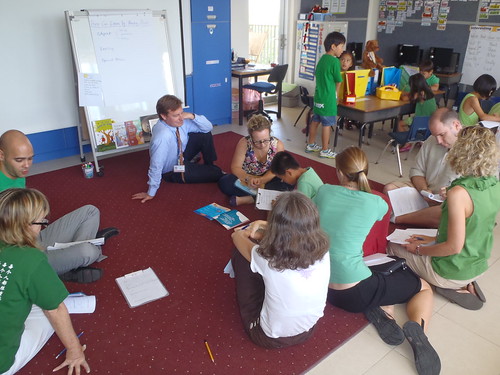 |
| The teachers watching Maggie Moon model a "Freeze-Frame" conference. |
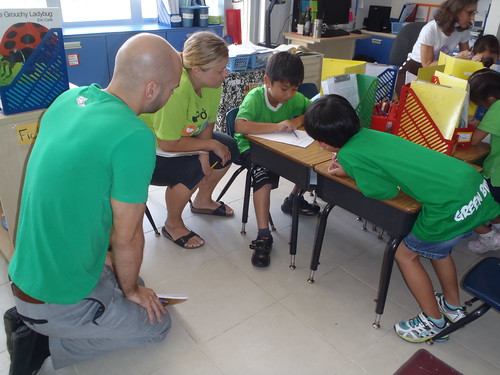 |
| Me and my partner Chris trying out the "Freeze-Frame" conferencing method on one of my students. |
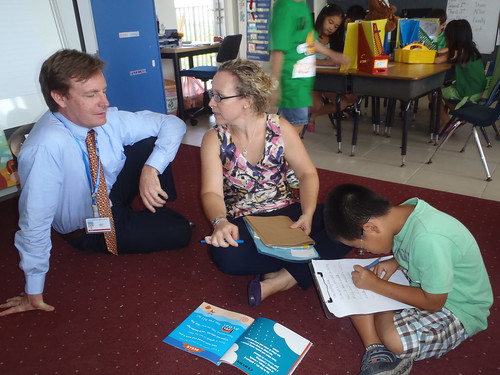
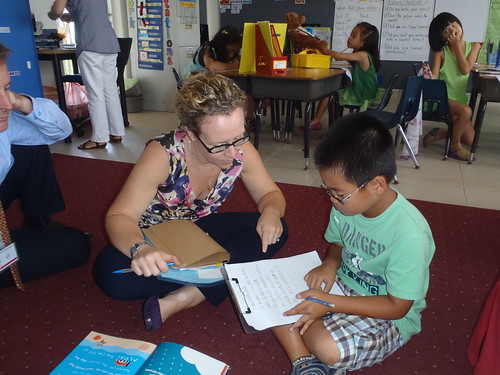
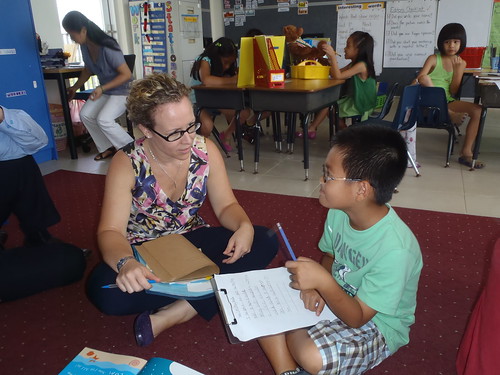
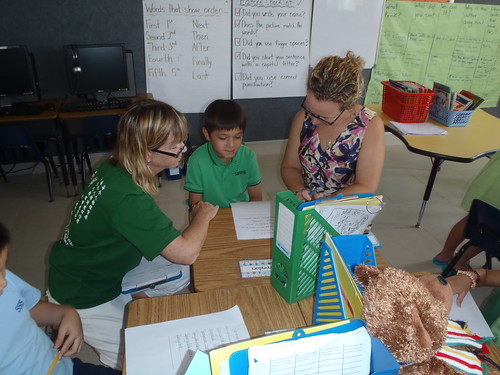
After looking at these photos you might be wondering why nearly everyone is wearing green.... It was Earth Week at the school and on this day everyone was supposed to wear a green shirt to show solidarity to the cause.
A letter from Maggie Moon after her visit to S.S.I.S....
Dear Liz,
Thanks so much for hosting the K/1 lab site. Your kids are off to a great start with their poems, and I'm sure you'll have a blast with them as they take their work to publication. I can tell you've put a lot of effort into your Writing Workshop this year, so kudos to you!
Good luck finishing up and have a great summer!
Thanks again,
Maggie
Thank you Maggie!!!
Saturday, March 10, 2012
Commitment to Ongoing Professional Learning
What is commitment to ongoing professional learning?
It is how I:
* These standards have been adapted from, The American School of Doha Teaching Standards, May 2008, and the Ontario Ministry of Education's Teacher Performance Appraisal System, March 2012.
It is how I:
- engage in ongoing professional learning and apply it to improve my teaching practice
- Share learning from professional development opportunities with colleagues in a structured environment, such as faculty, department, team meetings
- Provide leadership in school improvement initiatives by working on committees
Subscribe to:
Posts (Atom)






